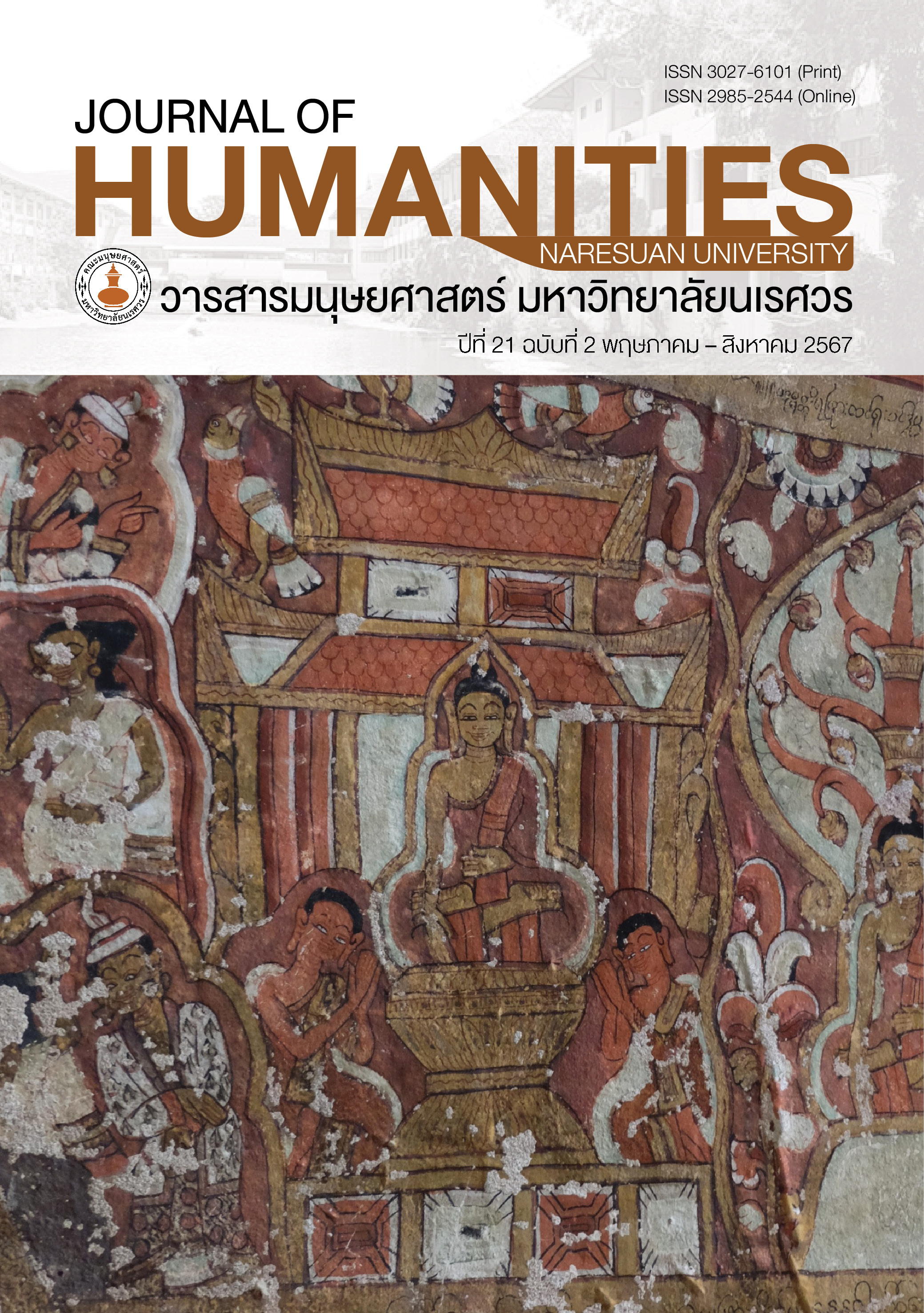วัจนกรรมแสดงความรู้สึกในจดหมายลาตายจากหนังสือพิมพ์ออนไลน์ไทย (พ.ศ. 2560 – พ.ศ. 2563)
Main Article Content
บทคัดย่อ
งานวิจัยนี้มีวัตถุประสงค์เพื่อศึกษาการใช้วัจนกรรมแสดงความรู้สึกที่ปรากฏในจดหมายของคนฆ่าตัวตายในประเทศไทยระหว่าง พ.ศ. 2560 – พ.ศ. 2563 เก็บข้อมูลจากจดหมายของคนฆ่าตัวตายซึ่งไม่ปรากฏชื่อผู้เขียนที่มีการเผยแพร่และนำเสนอในเว็บไซต์ข่าวออนไลน์ ได้แก่ https://www.thairath.co.th และ https://www.khaosod.co.th ตั้งแต่ พ.ศ. 2560 - พ.ศ. 2563 รวมจำนวนทั้งสิ้น 45 ฉบับ ผลการศึกษาพบว่า ในจดหมายของคนฆ่าตัวตายมีการใช้วัจนกรรมกลุ่มแสดงความรู้สึก 65 ถ้อยคำ จำแนกเป็น 8 วัจนกรรมย่อย ได้แก่ วัจนกรรมการขอโทษปรากฏ 16 ถ้อยคำ ซึ่งปรากฏมากที่สุดคิดเป็นร้อยละ 24.62 รองลงมาคือ วัจนกรรมการแสดงความสิ้นหวังและท้อแท้ ปรากฏ 14 ถ้อยคำ คิดเป็นร้อยละ 21.54 วัจนกรรมการตำหนิ ปรากฏ 9 ถ้อยคำ คิดเป็นร้อยละ 13.85 วัจนกรรมการอำลา ปรากฏ 8 ถ้อยคำ คิดเป็นร้อยละ 12.31 วัจนกรรมการขอบคุณปรากฏเท่ากับวัจนกรรมการแสดงความรัก ปรากฏ 7 ถ้อยคำ คิดเป็นร้อยละ 10.76 วัจนกรรมการอวยพรปรากฏ 3 ถ้อยคำ คิดเป็นร้อยละ 4.62 ตามลำดับ และวัจนกรรมการให้กำลังใจน้อยที่สุดปรากฏ 1 ถ้อยคำ คิดเป็นร้อยละ 1.54 ทั้งนี้ผลการศึกษาเป็นวัจนกรรมกลุ่มแสดงความรู้สึกที่แสดงออกผ่านถ้อยคำในจดหมายทั้งความรู้สึกที่ดีและไม่ดีอันอัดอั้นอยู่ภายในใจของผู้ตายต่อบุคคลรอบข้างหรือสิ่งต่าง ๆ แต่ไม่สามารถแสดงหรือบอกกล่าวให้ผู้อื่นทราบตอนยังมีชีวิตอยู่ ซึ่งอาจแสดงให้เห็นถึงสาเหตุหรือเหตุจูงใจของการฆ่าตัวตายได้
Article Details

อนุญาตภายใต้เงื่อนไข Creative Commons Attribution-NonCommercial-NoDerivatives 4.0 International License.
ข้อความรู้ใด ๆ ตลอดจนข้อคิดเห็นใด ๆ เป็นของผู้เขียนแต่ละท่านโดยเฉพาะ คณะมนุษยศาสตร์ มหาวิทยาลัยนเรศวร และกองบรรณาธิการวารสารมนุษยศาสตร์ฯ ไม่จำเป็นต้องเห็นพ้องด้วย
เอกสารอ้างอิง
Ambroise, B. (2010). From speech act theory to pragmatics. Retrieved February 20, 2021, from https://halshs.archives-ouvertes.fr/halshs400514810/file/From_speech_acts_theory_to_pragmatics_-_Bologna.pdf
Austin, J. L. (1975). How to do things with words: Second edition. London: Oxford University Press.
Bayat, N. (2013). A study on the use of speech acts. Paper presented at Akdeniz Language Studies Conference 2012, Antalya Turkey.
Cavanagh, J. T., Carson, A. J., Sharpe, M., & Lawrie, S. M. (2003). Psychological autopsy studies of suicide: A systematic review. Psychological Medicine, 33(3), 395-405.
Daghir, S. C., & Naima, I. H. (2011). A study of suicide letters in term of speech act theory. Journal of Basrah Researches (Humanities Series), 36(4), 139-157.
Department of Mental Health. (2021). Report on the suicide rate of Thailand. Retrieved February 20, 2021, from https://www.dmh.go.th/report/suicide/stat_prov.asp.
Fernández-Cabana, M., Ceballos-Espinoza, F., Mateos, R., Alves-Pérez, M. T., & García-Caballero, A. A. (2015). Suicide notes: Clinical and linguistic analysis from the perspective of the interpersonal theory of suicide. The European Journal of Psychiatry, 29(4), 293–308.
Freuchen, A., Ulland, D., & Mesel, T. (2018). Suicide notes written by child and adolescent suicide victims: A qualitative textual analysis. Scandinavian Psychologist, 5, e9. Retrieved February 20, 2021, from https://doi.org/10.15714/scandpsychol.5.e9
Khamma, A. (2013). Risk factors associated with suicide: A case - control study in Sukhothai Province. Journal of the Psychiatrist Association of Thailand, 58(1), 3-16.
Khumting, T., & Sookcharoen, P. (2022). Speech acts used in suicide notes. Srinakharinwirot Research and Development (Journal of Humanities and Social Sciences), 14(27), 62-74, Retrieved from https://so04.tci-thaijo.org/index.php/swurd/article/view/259756
Lesser, H. (1980). Suicide and self-murder. Philosophy, 55(212), 255–257. Retrieved from http://www.jstor.org/stable/3750589
Li, F., Lu, X., & Yip, P. S. F. (2020). A study of the characteristics of suicide notes in China. Crisis, 41(1), 32–38.
Matykiewicz, P., Wlodzislaw, D., & Pestian, J. (2009). Clustering semantic spaces of suicide notes and newsgroups articles. In Proceedings of the BioNLP 2009 Workshop (pp. 179-184), Boulder, Colorado: Association for Computational Linguistics.
Namratha, P., Kishor, M., Sathyanarayana Rao, T. S., & Raman, R. (2015). Mysore study: A study of suicide notes. Indian Journal of Psychiatry, 57(4), 379–382.
Orbach, I., Mikulincer, M., Stein, D., & Cohen, O. (1998). Self-representation of suicidal adolescents. Journal of Abnormal Psychology, 107(3), 435–439.
Ronan, P. (2015). Categorizing expressive speech acts in the pragmatically annotated SPICE Ireland corpus. ICAME Journal, 39(1), 25-45.
Searle, J. R. (1997). Speech acts: An essay in the philosophy of language. Cambridge: Cambridge University Press.
World Health Organization. (2002). World report on violence and health. Geneva: World Health Organization.


